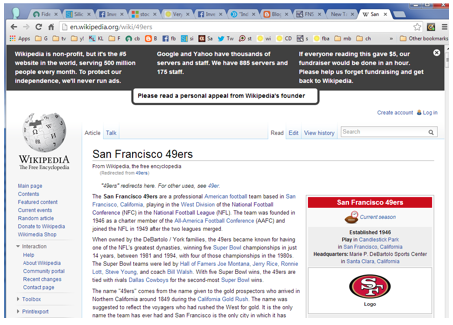Will Wikipedia Remain Self-Funded And Free With Donations?
Will Wikipedia Remain Self-Funded and Free with Donations?
By Kirk Lindstrom (Originally written Oct 10, 2013)
On Tuesday October 8, 2013 Wikipedia again tried to raise money with donations. They are the only top ten web site without advertising or subscription revenue. The nine web sites in the top ten listed in the table below generate significant income from advertising on their sites.
Wikipedia could partner with Microsoft or Google to serve ads and make money to pay their volunteers and managers then perhaps go public. This could generate a significant amount of revenue for them and their potential partner.
News today from insiders claim Wiki wastes donations which could put an end to those donations as a source of funds. Can Wiki remain advertising free?
On their website today they claimed they are the fifth busiest web site in the World.
- “Wikipedia is non-profit, but it's the #5 website in the world, serving 500 million people every month. To protect our independence, we'll never run ads.”
Here is the image I saw earlier today when I opened the drop-down on the Wiki page for the SF 49ers:

Here is the image with the drop-down closed:

The ten most visited web sites on the internet, according to Wikipedia, are:

For references and notes, see Notes
Note that when Wikipedia says they are ranked fifth, they combined the traffic from Google’s search and YouTube sites.
What strikes me about this list is all the sites except for Wikipedia rely on advertising. Microsoft can use their website to promote their own products like Office and Xbox, but they too use ads and have Bing for search ads.
My personal experience at Suite101.com as head of R&D reporting to the founders in the 1990s then “General Manager of Affiliate Accounts” in the early 2000s leads me to believe that advertising and/or paid access to web site information usually follows a request for donations.
I remember we tried soliciting donations at Suite101 in the early 2000s as a way to raise money to pay writers. I was successful selling my investment newsletter as moderator and editor for the investing topic at Suite101, but we found that readers didn’t want to pay for information from most of the other writers who wrote about everything from cats and recipes to world politics. We raised a small amount of money with donations but it wasn't worth the trouble. Google AdSense ads came soon after.
I left Suite101 completely in 2007 to write for myself and others like Seeking Alpha, but I received small payment for some of my articles they kept on the site until my last payment in June 2013. I had ten years of writing on the site but the income was but a trickle, hardly enough to attract quality writers who wanted payment just for their writing. The only value to a writer I saw was the ability to promote your own products as I was able to do when I worked for the founders. I heard the changes Google made to their search caused a large decline in Suite101 ranking and advertising dollars. Last month Suite101.com announced the site was sold again to start over.
“While it remained as authentic as ever at its core, Suite101 struggled to find a niche among its continuously innovating competitors, and never fully differentiated itself from a proliferation of made-for-search publishers. So it goes. By 2011, the brand had lost its mojo.”
Consumers Union, best known for “Consumer Reports” magazine, is one successful property that has been "Ad Free" for decades. Like Wikipedia, they too solicit donations from their readers who provide them with data via surveys but their readers also pay $29 per year for a magazine subscription and/or access to their online web site, ConsumerReports.org. Personally, I pay $49 a year to CU; $29 for their magazine and $20 for web site access.
Today an article in the UK charges Wikipedia founders of wasting donated money. From “Wikipedia Foundation exec: Yes, we've been wasting your money.”
The outbound exec of Wikipedia's tin-rattling nonprofit has admitted the organisation wastes public donations – and says procedures should be fundamentally changed to avoid corruption and self-interest.
In a candid statement, Sue Gardner, executive director of the Wikimedia Foundation, says she wants the worker bees rewarded – the editors who spend hours of unpaid time on Wikipedia – instead of the local chapters of bureaucrats who receive the money today.
After I found that article, I went back to Wikipedia and found they removed the donation page drop-down.

Nothing in life is ever really free or without internal politics. Only organized religion seems capable of lasting centuries with donations but they too are not without charges of corruption.
I believe Wiki will soon have ads and go public too unless they want to follow the Consumer's Union model to charge readers for access to their now free website.
What do you think Wikipedia will do going forward? Can any company rely on the donations of its users to pay its staff without limiting content to those who pay?
Disclosure: I am long GOOG, MSFT. I wrote this article and it expresses my own opinions. I am not receiving compensation. I have no business relationship with any company whose stock is mentioned.



